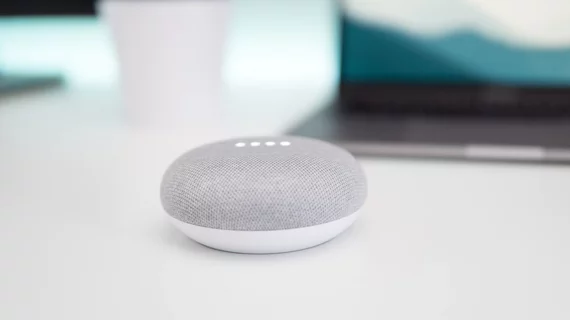How ‘smart speakers’ like Google Home revolutionize the OR experience
Smart speakers—devices like the Amazon Echo and Google Home—are reframing the way physicians work in the operating room, allowing for hands-free communication that could cut time and risk, according to research presented at the Society of Interventional Radiology’s 2019 Annual Scientific Meeting in Austin, Texas.
The work, conducted by a team at the University of California, San Francisco, involved developing a device-sizing application for the Google Home smart speaker, which was initially marketed as a personal home assistant with the ability to play music, check calendars, forecast traffic and control lighting systems. In an alternate setting, Kevin Seals, MD, and colleagues programmed a Google Home-compatible app to process questions from a physician’s voice and provide recommendations on the precise sizing of medical devices.
Seals et al. used literature reviews for 475 interventional radiology devices like catheters, sheaths, stents and vascular plugs to build a natural language processing-powered database of size specifications for the Google Home. The team said a physician can use their app to ask, for example, which size sheath to use to implant a stent, and the Google Home would reply with the right size based on the patient’s specific circumstances.
“There are hundreds of devices, with more being introduced every day, making it difficult to determine the correct sizing or materials needed in every circumstance,” Seals said in a release. “This technology allows physicians to concentrate more closely on the care of their patients, devoting less time and mental energy to device technicalities.”
The tech also permits physicians to communicate about necessary medical information without having to break scrub.
“During treatment, interventional radiologists rely on nuanced medical information delivered in a timely manner,” Seals said. “When you’re in the middle of a procedure, you need to remain sterile, so you lose the ability to use a computer. This smart speaker technology helps us to quickly and intelligently make decisions relevant to a patient’s specific needs.”
Seals and his colleagues’ next steps include growing their technology database to include information about material costs and inventory databases, as well as extending the approach to other clinical specialities.

